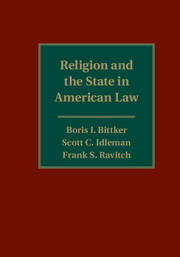Book contents
- Frontmatter
- Dedication
- Contents
- Preface
- 1 History and Introduction
- 2 Church and State in the Nineteenth Century
- 3 Religious Influences and Expressions in Law and Government
- 4 The Establishment Clause
- 5 The Free Exercise Clause
- 6 The Religious Test, Equal Protection, and Free Speech Clauses
- 7 The Definition of Religion
- 8 Church Property Disputes and Church Schisms
- 9 Contracts
- 10 Taxation
- 11 Employment
- 12 Land Use
- 13 Torts
- 14 Criminal Law and Process
- 15 Family Law
- 16 Public Education
- 17 Religious Symbolism on Government Property
- 18 Special Contexts: Prisons and the Military
- Appendix A Federal Constitutional Provisions
- Appendix B State Constitutional Provisions
- Appendix C Selected Federal Statutes 910
- Index
8 - Church Property Disputes and Church Schisms
Published online by Cambridge University Press: 05 October 2015
- Frontmatter
- Dedication
- Contents
- Preface
- 1 History and Introduction
- 2 Church and State in the Nineteenth Century
- 3 Religious Influences and Expressions in Law and Government
- 4 The Establishment Clause
- 5 The Free Exercise Clause
- 6 The Religious Test, Equal Protection, and Free Speech Clauses
- 7 The Definition of Religion
- 8 Church Property Disputes and Church Schisms
- 9 Contracts
- 10 Taxation
- 11 Employment
- 12 Land Use
- 13 Torts
- 14 Criminal Law and Process
- 15 Family Law
- 16 Public Education
- 17 Religious Symbolism on Government Property
- 18 Special Contexts: Prisons and the Military
- Appendix A Federal Constitutional Provisions
- Appendix B State Constitutional Provisions
- Appendix C Selected Federal Statutes 910
- Index
Summary
The issues underlying church property disputes and church schisms are directly connected to the role of courts vis-à-vis religion. Central to this role is the notion that state and federal courts do not involve themselves in ecclesiastical disputes, but courts may address issues concerning civil or property rights as long as they need not resolve ecclesiastical issues in order to do so. This rule raises numerous questions, and several settled principles of law have arisen as a result, but different jurisdictions have sometimes interpreted these rules in different ways. For the most part, as will be seen herein, each question that arises seems to garner a majority approach and several minority approaches that are generally closely related to the majority approach. One of the first questions most jurisdictions ask in church property dispute and church schism cases is what kind of religious institution is involved? Is it hierarchical or congregational? If the former, what is its structure? If the latter, how does it govern itself? The next question that is often asked is whether the issue involved in the case requires the determination of ecclesiastical matters. If so, the courts generally find that they have no jurisdiction. If not, the analysis generally continues.
Church property disputes often involve church schisms, but property cases are frequently held to be addressable by the courts using either neutral principles of law or another acceptable method. Church schism cases that do not involve property can involve a variety of issues such as employment disputes, disputes over membership status,disputes over control of the church, and disputes over financial matters. This chapter will address the law applicable to church property disputes and that applicable to church schisms in separate sections. The law addressing church property disputes is frequently used in church schism cases, so we will first address church property disputes and then church schisms.
Church Property Disputes
The most recognized rule applicable to church property disputes comes from Watson v. Jones, decided by the U.S. Supreme Court in 1871. The Watson case involved a dispute over church property at the Walnut Street Presbyterian Church, located in Kentucky. The ultimate question was which of two factions claiming to have authority to control church property was entitled to exercise that authority.
- Type
- Chapter
- Information
- Religion and the State in American Law , pp. 359 - 393Publisher: Cambridge University PressPrint publication year: 2015



